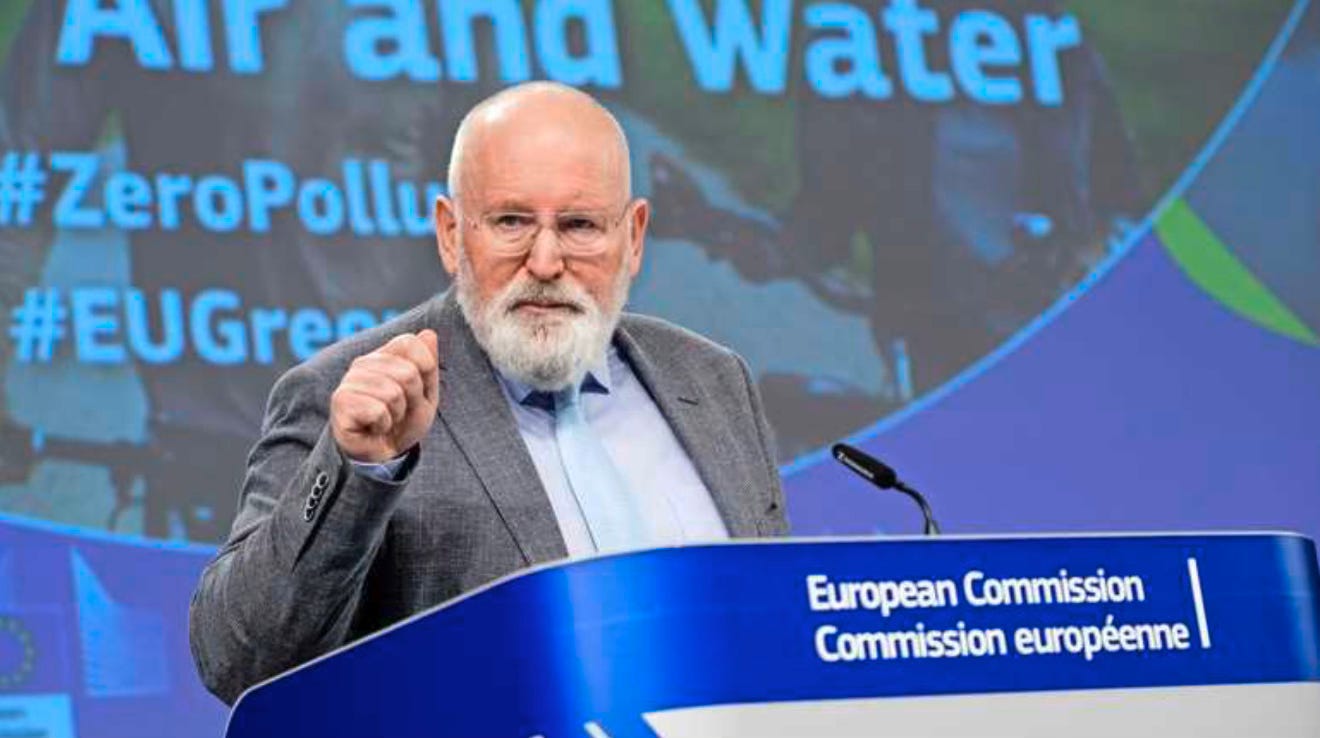Green Deal, Faustian Pact
The leading Dutch daily newspaper reveals a major corruption scandal within the European Commission. In France, the press looks the other way.
De Telegraaf is the largest daily newspaper in the Netherlands. It has published what could well be the next major scandal to be attributed to European institutions.
According to documents revealed by the budget control committee, the European Commission, under the tenure of former Commissioner Frans Timmermans, who was the First Vice-President of the European Executive from 2014 to 2023, allegedly funded environmental NGOs to pressure MEPs and member states in favor of the Green Deal, the controversial environmental initiative. This amounts to pure bribery with European taxpayers' money to rig the institutional game.
According to De Telegraaf, at least 700,000 euros were used to pay environmental organizations and influence the debate on agriculture. Pressure was also exerted to ensure that, after months of deadlock, the Nature Restoration Law would be passed.
"These groups were allegedly incentivized to defend Timmermans' plans in exchange for funding. The affair was triggered by questions from Dirk Gotink, a Dutch MEP from the EPP. During a meeting of the European Parliament's budget committee, Gotink mentioned lists of MEPs to influence that the Commission allegedly passed to certain NGOs," the Dutch daily newspaper highlights.
The new Polish Commissioner for Budget, Piotr Serafin, acknowledged an "inappropriate practice." An investigation is underway. It should be noted that this is not about questioning lobbying or NGO funding, as Timmermans emphasizes in his (poor) defense 1. Instead, it's about ethics, highly questionable mixing of roles, corruption, and misappropriation of funds. These flaws in the European institutions, which are quite permeable, as we have seen and can still see with regard to energy issues, serve a multitude of interests.
"European Commission officials were working on the communication campaigns of lobbying networks that they themselves funded," asserts Dirk Gotink. At the forefront is the European Environmental Bureau, an NGO grouping 180 associations, whose very name is misleading as it suggests it is an official institution.
You will hardly hear about this scandal in France. L'Eclaireur has a habit of denouncing the recurring media silence in France as "the scandal within the scandal." However, the press did make headlines about the Green Deal... but only to highlight that Jordan Bardella – the leader of the National Rally, the very radical right in France – is demanding its immediate suspension. This has nothing to do with the looming scandal though; Bardella, who is nevertheless a European Parliament member and thus responsible for overseeing the execution of the European institutions' budget, has indeed said nothing on the matter.
What exactly is the Green Deal, defended by the entire von der Leyen Commission, with Frans Timmermans at the forefront until his resignation in 2023 ? It is essentially an environmental roadmap set by Brussels with the goal of achieving a chimeric "climate neutrality" by 2050. It comprises a set of policies ranging from agriculture – but without the CAP (Common Agricultural Policy) – to biodiversity, encompassing energy and pesticides. In Eurocratic jargon, this is known as "cross-cutting."
In reality, rather than a Green Deal, it looks a lot like good old greenwashing, without concrete objectives. One can see the vagueness in Ursula von der Leyen's mission letter. When put to the test, the Green New Deal seems to be worth no more than the paper it's printed on. For instance, in the agro-food industry, there's talk of "sustainable agriculture," the importance of "food security," or "plant and animal health." Since then, the EU has signed agreements with Vietnam and Mercosur, neither of which are known for their high environmental or social standards.
On the energy front, the Green Deal claims to fully commit to phasing out fossil fuels and transitioning, in a rather hazardous manner, to hydrogen. Since then, hundreds of millions of euros have been invested in the construction and support of gas projects.
It's an understatement to say that the European Union is running around like a headless chicken, driven and guided by all sorts of special interests. In this regard, the architect of the Green Deal might well be its symbol : the Dutchman Diederick Samsom was a Greenpeace activist before becoming the leader of the Labour Party, and then Timmermans' right-hand man. He has since transitioned into the gas sector by taking the chairmanship of Gasunie's supervisory board, the Dutch equivalent of Engie (French energy industrial group; its main shareholder is the French state) without notifying the Commission as required by ethical rules…
The European Commission plans to cut the budget of the LIFE program, a European funding program for environmental projects – 5 billion euros for the period 2021-2027.





Dear Pascal,
all governments and international Institutions do fund NGO.
EU collaborates with NGO which support official european policies.
EU funds/budget stem from its « EU own ressources » (not national ones).
In cases of misuse of EU subventions, appropriate EU control bodies exist to take necessary counter-measures.
EU Commission participation in public debates held in the EP or in public member states bodies is legitimate - and regulated by appropriate guidelines.
I am not aware of any official/legal incrimination of ex-Commissioner Tindemans.
« Faustian Pact » is a good journalistic catch-word but an excessive (inappropriate ?) one in this specific case.
Jean-Guy Giraud
https://www.lesamisdutraitedelisbonne.com
Afuera!!!